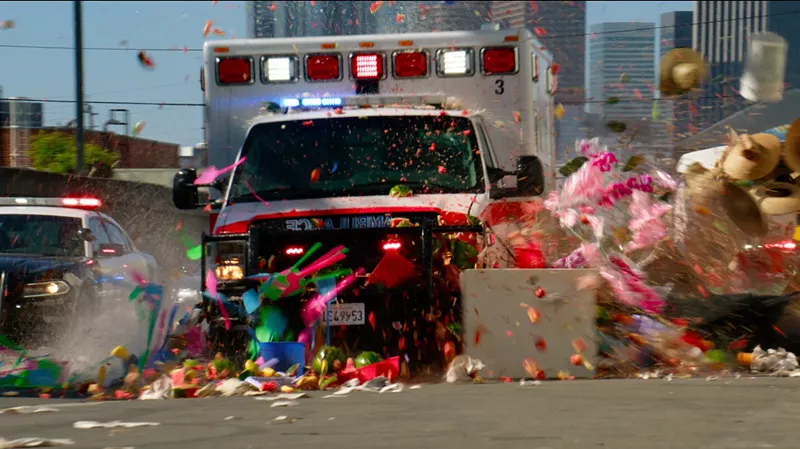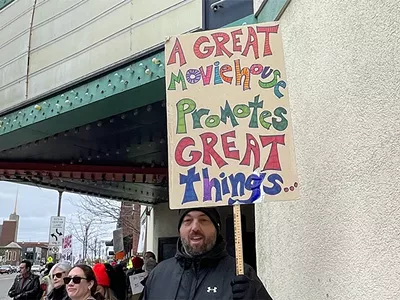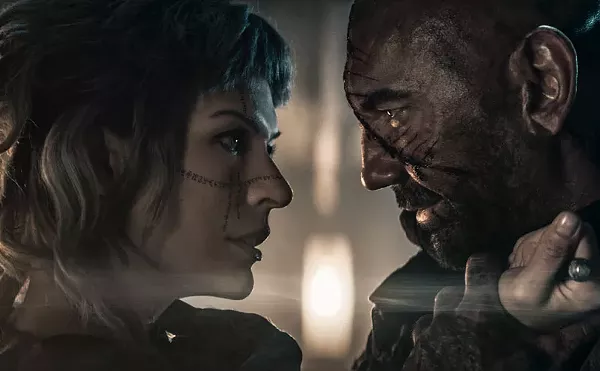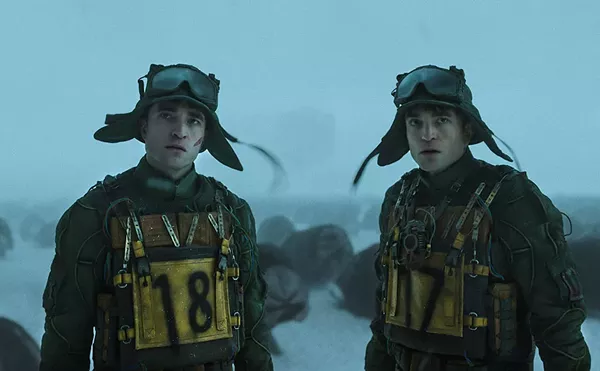“We got 5 minutes to know whether you’re in or you’re out,” says hectoring bank robber Danny Sharp, played by a maximally bitchy Jake Gyllenhaal, to his reluctant, stoic ex-Marine brother Will (Yahya Abdul-Mateen II) not long after Ambulance kicks off. Many viewers may feel some of Will’s hesitation themselves in that moment of commitment, coming to the promise and the portent of this newest Michael Bay action film. Regardless of where one lands on Bay’s work more broadly, though, he’s found a story here which unquestionably plays to his strengths, packaging its action and Bay’s maximalist tendencies within an ingeniously tidy conceit. A bit improbably, Ambulance finds life through the balance of its script’s compression and a wild director’s countless flourishes, making for as buoyant an action film as we’re likely to find stateside for a while.
Within Ambulance’s first leg, exposition bubbles up with an effervescent fizz, with intermittent (and improvised-seeming) blather providing a sort of leaden counter-rhythm to its carbonated hiss. There’s a sense in watching that Bay, in introducing his players — including an ample stable of supporting actors, an obscenely skilled paramedic (Eiza Gonzalez), and its leading, contrasting pair of adoptive brothers — knows just where each should enter, land, and move. Echoing Heat, Speed, and bits of ER alongside plenty else, Ambulance is less a feat of originality than of arrangement; its success rides less on the perfection of its various pieces (and there are certainly misfires) than in the fact that even its worse steps feel properly placed.
While some moments sag, Ambulance tends to feel remarkably finessed in its orchestration, covering a great deal of ground while maintaining a pleasing air of economy. Its premise sees two brothers come together to execute an ostensible last job, robbing a bank and shooting a cop in the haphazard process — then finds them using an ambulance as a getaway car. Within it, they struggle along with Cam, Gonzalez’s paramedic, to keep him alive, a premise which bakes into the action a queasy mix of principle and self-preservation as their stolen vehicle careens around the city. With Chris Fedak taking on writing duties here in adapting a Danish film of the same name, Ambulance manages to blend old tropes and genres (heist, hostage, and medical thrillers) in ways that feel invigorated through recombination; before too long, it manages to feel a little new.
Towering above its actors, Ambulance’s most significant source of expression is Bay himself, whose maximalist tendencies provide most of his movies the sometimes burdensome task of accounting for them. Here, his working methods give life to the film’s largely contained action, glued as it is to steady escalations within and around a single vehicle jetting around an endless web of blocked-off roads. Repression and reserve are not part of Bay’s syntax — but a sense of reserve, at least, seems to lie in the marrow of Ambulance’s Danish crime-rooted narrative material. When Gyllenhaal proclaims “we don’t stop”to the army of police pursuing the Sharp brothers, it’s a kind of manifesto for the film itself. As it embarks on a steady path of dramatic and eventually explosive escalation, Bay’s manic, eagerly gestural craftsmanship only heightens the script’s air of orderly compression.
It’s not news to say that Bay’s language hails from American advertising: a space of warm climates, toned bodies, and blue skies. Shooting conventionally attractive figures in canted angles from below — a technique which grants his characters an aura of physical stature and accompanying power — Bay’s camera reliably evokes grandeur and confidence even as his ceaseless cutting subverts that, lending a faintly tremulous vibration to the register of his voice.
While invested in magnitude, Bay cares deeply for movement, too — and his focus on building out spaces geometrically from a pile of angles even as objects and camera barrel through them is in full play here, leading him to push himself artistically with a gym addict’s air of compulsion. Ambulance’s action may be straightforward, but it’s built like a lot of bold and expertly made films: through the tenuous joining of shattered scraps of time. Formal digressions pull it in different directions, with drones skating giddily along skyscrapers’ vertical surfaces and action fragmenting into expressive, just-legible shards. Balancing this rule-breaking formalism shared with some peers (less dizzyingly bold than Tony Scott’s, less dreamily disorienting than Kathryn Bigelow’s) against a largely unquestioning approach to politics, fashion, and style, Bay’s focus is less on the default (and thus dominant) materials of mainstream culture that make up his cinema than on the formal feats they enable him to take on. Watching Ambulance work as well as it does from a relatively modest script can feel, then, like watching an Olympic lifter succeeding, managing much more — and more extravagantly — than anyone should need to do.
But a politic seeps anyway into Ambulance’s fabric, its material treated ambiguously given the impossibility of it being exactly neutral. Part of its atmosphere of risk stems not just from Bay’s formalism but from the political charge of a shot cop and the Sharps’ ruthless gambit of deploying his brink-of-death state as a shield as they attempt a criminal getaway. The LAPD’s onscreen iteration retaliates in ways obscene enough to believe, unleashing military-grade shows of force (helicopters, drones, barricades, blocked-off roads) in a massive population center for hours before the FBI can even get wind of things. Threatening airstrikes and like maneuvers against two crooks they could simply let get away with liquid assets guaranteed to be insured, it’s clear that the only thing that muzzles them, preventing a dangerous snapping and lashing out, is the presence in the ambulance of one of their own. How Bay regards this past the level of spectacle isn’t terribly clear — but the police force’s seismic and frequently botched efforts at realiation could make a case for defunding all on their own.
There’s another politic within the ambulance itself and between the two brothers, too: one a bit more explicitly engaged with American dynamics around inequality, power, and race. It’s one that pits Gyllenhaal’s Danny — a white, privileged bachelor, and not to mention an erratic, catty micromanager — against the more honorable, quiet Will — a Black veteran, who proves determined not to hurt Cam, their hostage paramedic. Ambulance makes clear that he only took part in the film’s heist so he could care for his wife and child. But this dialectic, which frames the monogamous, faithful, and put-upon Will as a beacon of relative virtue, is largely insulated from the film’s treatment of policing, contained with the car. While ennobling and well-meaning, it leaves Abdul-Mateen II stuck as a performer in an artistically limited straight-man role, one that deprives him at least a little as a performer even as it seems meant to balance out both Gyllenhaal and the film.
Bay seems somewhere between apathetic and amenable to all this — and while he certainly seems to buy into the case for Will the script makes, it’s plainly not where his chief interests lie. Despite its very Hollywood non-commitments in terms of the politics at its edges, Ambulance’s success — which we might call a strong performance against expectation — doesn’t rest on the perfection or thorough consideration by its makers of all its parts. What Bay’s managed here is spotted by the elements he’s left undercooked or a bit haphazard, for they’re largely placed, at least, in ways that feel narratively right.
Stay connected with Detroit Metro Times. Subscribe to our newsletters, and follow us on Google News, Apple News, Twitter, Facebook, Instagram, Reddit, or TikTok.







